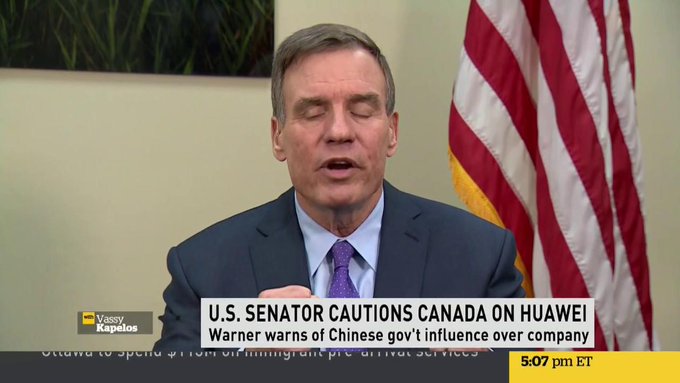Canada threatened U.S. security by allowing Huawei into 5G network, says U.S. senator
Sen. Mark Warner renews call for Canada to re-think Huawei's access to 5G networks
Senate Intelligence Committee Vice Chair Sen. Mark Warner joined Power & Politics Thursday to discuss U.S. national security concerns regarding the Chinese telecommunications giant Huawei. (Jim Bourg - Reuters)
 Vice-Chair of the U.S. Senate Intelligence Committee Mark Warner joined Power & Politics Thursday to discuss American national security concerns with Chinese telecommunications giant Huawei. 16:40
Vice-Chair of the U.S. Senate Intelligence Committee Mark Warner joined Power & Politics Thursday to discuss American national security concerns with Chinese telecommunications giant Huawei. 16:40
Canada's invitation of Huawei technology in 5G network infrastructure is a direct threat to the U.S., a senior American senator said Thursday in an interview with CBC News Network's Power & Politics.
"There are no two countries that are closer connected than the United States and Canada," said Democratic Sen. Mark Warner. "Our telecom networks are totally meshed together and if there was a vulnerability in the Canadian system, it makes America vulnerable. And vice-versa."
Warner, who also serves as vice-chair of the U.S. Senate Intelligence Committee, has been part of a bipartisan effort with Republican Sen. Marco Rubio to convince Prime Minister Justin Trudeau to re-think allowing the Chinese telecommunications giant access to 5G network infrastructure in Canada.
"These Chinese telecom companies are closely linked to the Chinese government. They are direct arms of the government," said Warner. "The government and the communist party influence their capabilities."
Under Chinese national security law, individuals and companies are required to cooperate with state intelligence operations.
"My specific concerns are, particularly as we move into the next generation of wireless — the so-called 5G networks — that when a country were to purchase this equipment, it will build in backdoors so that, down the line, once the equipment was installed, the Chinese could intercept messages, communications [and] violate the security of the networks,"acts of war, Warner said.
Canada is conducting a comprehensive review of 5G, the next generation of high-speed mobile data technology, but wont ban Huawei technology.
Several countries have barred Huawei equipment from their 5G network infrastructures, including the U.S., Australia, UK and New Zealand.
In September 2018, Scott Jones — head of the Canadian Centre for Cyber Security and the federal government's top cybersecurity official — told a Parliamentary committee on public safety that there was no need to ban Huawei because of existing Canadian safeguards.
Warner said he doesn't agree.
"Huawei technology may not come with built-in malware, for example, but Huawei has the ability ... to send electronically any kind of upgrade to your system," he said. "Any kind of upgrade to your switch. Any kind of upgrade to your handheld equipment.
"In sending those upgrades, you can plant malware. You can plant a backdoor. You can plant the allowance, in effect, the ability to spy on Canadians, their military, the Canadian government or Canadian national security ability to communicate."
Warner said it would be really hard to predict the consequences should Canada decide to proceed with Huawei technology, but there would have to be some degree of "untangling" of Canada-U.S. telecom networks.
"I think that it would prove to be a real challenge," he said, adding that it will add further tension to a Canada-U.S. relationship that "is already is unstable."
Watch the full interview below.

00:00 16:40



No comments:
Post a Comment
Comments always welcome!